- Home
- Naguib Mahfouz
Khan Al-Khalili
Khan Al-Khalili Read online
NAGUIB MAHFOUZ
KHAN AL-KHALILI
Naguib Mahfouz was one of the most prominent writers of Arabic fiction in the twentieth century. He was born in 1911 in Cairo and began writing at the age of seventeen. His first novel was published in 1939. Throughout his career, he wrote nearly forty novel-length works and hundreds of short stories. In 1988 Mahfouz was awarded the Nobel Prize in Literature. He died in 2006.
THE FOLLOWING TITLES BY NAGUIB MAHFOUZ
ARE ALSO PUBLISHED BY ANCHOR BOOKS:
The Beggar, The Thief and the Dogs, Autumn Quail
(omnibus edition)
Respected Sir, Wedding Song, The Search (omnnibus edition)
The Beginning and the End
The Time and the Place and Other Stories
Midaq Alley
The Journey of Ibn Fattouma
Miramar
Adrift on the Nile
The Harafish
Arabian Nights and Days
Children of the Alley
Echoes of an Autobiography
The Day the Leader Was Killed
Akhenaten, Dweller in Truth
Voices from the Other World
Khufu’s Wisdom
Rhadopis of Nubia
Thebes at War
Seventh Heaven
The Thief and the Dogs
Karnak Café
Morning and Evening Talk
The Dreams
Cairo Modern
The Cairo Trilogy:
Palace Walk
Palace of Desire
Sugar Street
FIRST ANCHOR BOOKS EDITION, SEPTEMBER 2011
English translation copyright © 2008 by Roger Allen
All rights reserved. Published in the United States by Anchor Books, a division of Random House, Inc., New York, and in Canada by Random House of Canada Limited, Toronto. Originally published in Arabic as Khan al-Khalili in 1946. Copyright © 1946 by Naguib Mahfouz. This translation first published in English in hardcover in Egypt and the United States by The American University in Cairo Press, Cairo and New York, in 2008.
Anchor Books and colophon are registered trademarks of Random House, Inc.
This is a work of fiction. Names, characters, places, and incidents either are the product of the author’s imagination or are used fictitiously. Any resemblance to actual persons, living or dead, events, or locales is entirely coincidental.
The Cataloging-in-Publication Data is on file at the Library of Congress.
Cover photograph © Grant Faint/Photographer’s Choice/Getty Images
Cover design by Eric Fuentecilla
eISBN: 978-0-307-94870-0
www.anchorbooks.com
v3.1
Contents
Cover
About the Author
Other Books by This Author
Title Page
Copyright
Chapter 1
Chapter 2
Chapter 3
Chapter 4
Chapter 5
Chapter 6
Chapter 7
Chapter 8
Chapter 9
Chapter 10
Chapter 11
Chapter 12
Chapter 13
Chapter 14
Chapter 15
Chapter 16
Chapter 17
Chapter 18
Chapter 19
Chapter 20
Chapter 21
Chapter 22
Chapter 23
Chapter 24
Chapter 25
Chapter 26
Chapter 27
Chapter 28
Chapter 29
Chapter 30
Chapter 31
Chapter 32
Chapter 33
Chapter 34
Chapter 35
Chapter 36
Chapter 37
Chapter 38
Chapter 39
Chapter 40
Chapter 41
Chapter 42
Chapter 43
Chapter 44
Chapter 45
Chapter 46
Chapter 47
Chapter 48
Chapter 49
Chapter 50
Chapter 51
Translator’s Afterword
Glossary
1
It was half past two in the afternoon on a September day in 1941, the exact time when civil servants left their government offices. Streams of them came pouring out of the ministry’s doors like a raging torrent. Their minds had long since become preoccupied with a combination of hunger and sheer boredom, and now they all scattered in different directions under the burning glare of the sun.
Ahmad Akif, whose job was at the Ministry of Works, was among them. At this time of day he usually made his way back to al-Sakakini, but today was different: for the first time he was heading toward al-Azhar. He had been living in al-Sakakini for a long time, stretching back many years, whole decades in fact. Those many years constituted a veritable storehouse of memories—memories of childhood, youth, adulthood, and then middle age. The incredible thing was that it had only taken the family just a few days to make up their minds to pack up and leave. They had all felt completely secure in their old house; they had never imagined leaving. But then during the short interval between one evening and noon the next day everyone had started yelling, “A pox on this awful quarter!” Fear and panic had taken over; there was no longer any point in trying to persuade scared folk to change their minds. The old house had soon become a memory of the past, and the new house in Khan al-Khalili was a reality from today and onward into the future. Well might Ahmad Akif quote the phrase, “Praise be to the One who changes things but who never changes Himself!”
The suddenness of the decision to move had left him in a quandary. His heart kept drawing him back to the beloved old quarter; he bitterly regretted the feeling of being tossed out and thrust into one of the ancient popular quarters of Cairo. But at the same time he could not forget the relief he had felt when he realized that he would now be far away from a kind of hell that threatened imminent destruction. Maybe tonight would turn out to be the first time he managed to get any sleep since that terrible night, the one that had given the people of Cairo such a terrible shock.
It was therefore with mixed emotions—sadness and forbearance—that he paced the sidewalk waiting for the trolley that would take him to Queen Farida Square. Sweat was pouring off his brow, and yet he could still feel a certain frisson of pleasure at the thought of new discoveries and the prospect of change: a new place to live, new environment, new atmosphere, and new neighbors. Maybe luck would turn out differently and good times would return once again; perhaps the ever-so-subtle intimations he was now feeling would manage to shake off the layers of dust left behind by so much lethargy and inject some new sense of life and energy.
This then was the sheer delight of exploration, taking risks, and pursuing dreams; not only that, but also a hidden sense of superiority that grew out of his moving from one quarter to another that was of lower status in both prestige and educational level. He had not even set eyes on the new house as yet because he had been at work in the ministry when he was notified that the furniture had been moved first thing in the morning. Now here he was, on his way to the new house following the directions he had been given.
“It’s only temporary,” he told himself. “They’ll have to put up with it as long as the war lasts. Then things will get better.”
Could it have turned out any better? Would it have made more sense to stay in the old quarter, even though it would involve watching and listening to the fearsome noises of death?
He could not stand spending ages doing nothing, so he kept pacing the sidewalk. By now his nerves s
eemed to have calmed down a bit, but the way he was smoking a cigarette so quickly was evidence enough of how preoccupied he was. His nervous gestures, anxious expression, and generally disheveled appearance made him look like an exhausted old man with heart problems; the look in his eyes was distracted, as though he were out of touch with his surroundings. Actually he was approaching his forties. The fact that he was so tall and thin might attract people’s attention, not to mention the regrettably scruffy state of his clothes. To tell the truth, his torn trousers, the too-short sleeves of his jacket, the sweat and dust that accumulated at the rim of his tarboosh, the tightness of his shirt, the shabby necktie, his balding pate, and the creeping grayness that showed at his temples and the back of his head—all these features suggested that he was getting on in years. Beyond all that, there was his skinny, elongated face with its pale complexion, part of a small-sized cranium that sloped gently toward his fairly narrow forehead framed by eyebrows that were straight and widely separated. His eyes were widely spaced too and narrow, almost filling the entire contours of his face; whenever he squinted so as to concentrate on something or shield them from the sun’s glare, they looked as though they were shut; their deep honey-colored irises simply vanished. His eyelids drooped, and their corners had by now acquired a reddish hue. He had a narrow nose, thin lips, and a small, tapered beard. Incredible as it may seem, there had been a time when people regarded him as someone who was fussy about his appearance, a trait that had made him appear quite acceptable. However, a combination of despair and thriftiness, followed by a peculiar aspiration to look like an intellectual, had robbed him of any concern about either his person or his manner of dress.
As he boarded trolley no. 15 he mustered a smile that revealed a set of teeth yellowed by smoking. From Queen Farida Square he caught another trolley, no. 19. Out of force of habit he had actually made a mistake by throwing away the ticket that he had bought on the first trolley. He needed to go to al-Azhar, and so he had to buy another ticket, all the while laughing at himself in exasperation.
His secret craving for sex gnawed at him; truth to tell, for some time he had inured himself to ever being head of a household, and to staying single, at least up until now. He never spent even a penny without thinking about it, so his cravings were not so strong as to prevent him from spending money, but even so he still found it painful when forced to do so. Finally he reached al-Azhar and headed toward Khan al-Khalili, his new destination. He made his way through a narrow alleyway in the direction of the quarter in question. To his left and right were new apartment blocks with countless alleyways and walks interspersed between them; they looked like row upon row of imposing barracks where you could easily lose your way. All around him he spotted cafés teeming with customers and the occasional store, some selling taamiya, others jewelry and trinkets. And there were hordes of people, a never-ending flow, some wearing turbans, others fezzes, and still others skullcaps. The air was filled with shouts, yells, and screams, all of them guaranteed to shatter the nerves of someone like himself. He felt ill at ease and jumpy. He had no idea where he was going, so he went over to a Nubian doorman sitting beside the entrance to a building and said hello.
“Where’s the street to building number seven, please?” he asked.
The man stood up courteously. “You must be looking for apartment twelve, where people moved into today,” he replied, pointing in the right direction. “See that passageway? Take it to the second alleyway on the right, then go as far as Ibrahim Pasha Street, then the third door on the left will be building number seven.”
He thanked the doorman and proceeded down the passageway. “Second alleyway on the right,” he kept mumbling to himself. “Okay, so here it is. Now, third building on the left.” He paused for a moment and looked at his surroundings. The street was long and narrow, with four square apartment buildings on either side, all of them connected by side-passages that intersected with the main street. The sidewalks of these passageways and the main street itself were crowded with various stalls: watch repairer, calligrapher, tea maker, rug maker, clothes mender, trinket seller, and so on. Here and there cafés were scattered around, but they were no larger than the stalls. Doormen stayed close to the building entrances, their faces as black as pitch, their turbans as white as milk, with expressions languid enough to give the impression that the perfumed scents and wafts of incense that floated through the air had sent them into a stupor. The atmosphere of the place was enveloped in a brownish haze, as though the entire quarter never saw the sun’s rays. The reason was that in many places the sky was blocked by overhanging balconies. The various craftsmen sat in front of their stalls, patiently and skillfully plying their trade and producing little masterpieces; the ancient quarter still preserved its long-standing reputation as a place where the human hand could make exquisite crafts. It had managed to withstand the influx of modern civilization and to confront the insane pace with its own calming wisdom; its simple skills stood counter to complex technologies, its reverie of imagination to an uncouth realism, and its drowsy ocher hue to the gleaming brilliance of modernity. As he took in the scene with confusion, he wondered to himself whether he would be able to get to know this new quarter the way he had the old one. Would the day ever come when he could make his way through this maze without even thinking about it, following the path wherever his feet took him because his mind was so distracted by other matters?
“In the name of God the Compassionate, the Merciful,” he intoned as he approached the door.
He walked up the spiral staircase to the second floor and found apartment 12. When he spotted the number he smiled, almost as though he had known it for some time and was pleased to see it again after a long absence. He rang the bell, and the door opened. His mother was standing at the threshold, smiling in welcome.
“Do you see this wonderful new world of ours?” she said with a laugh as she let him in.
He entered the apartment. “Congratulations on the new home!” he replied with a smile.
Her laugh revealed yellowing teeth because she too, like her son, smoked a lot. “I’m sorry,” she went on apologetically, “we haven’t been able to put the furniture in your room or ours today. It’s been a really exhausting day. In spite of our best efforts, a chair leg was broken, and the headboard of your bed was scratched in some places.”
Ahmad found himself in a small room stuffed full of utensils, chairs, and pieces of furniture. In the middle stood the table with crockery and rolled-up rugs on it. The room had two doors, one to the right of the entrance, the other straight ahead. He took it all in without saying a word.
“God knows,” his mother commented, “I’ve not had a moment’s peace today. Pity the poor mother who’s never given birth to a daughter so she can lend a helping hand when needed. You ran away to your ministry and your father’s huddled in his room as usual. Even so he still found the energy—God forgive him—to ask a short while ago what I was preparing for dinner, as though I’m some kind of magician who can conjure up anything she wants! Fortunately this new quarter we’re living in is full of food stalls. I’ve sent the servant to buy us some taamiya, salad, and zucchini.
At the word taamiya Ahmad’s tastebuds began to salivate, and his anticipation was reflected in the gleam in his eye.
“So is my father feeling relaxed and at ease?” he asked his mother.
His mother smiled sweetly, showing that, even though she was now fifty-five years old, she had lost none of her feminine charm. “Yes, thank God!” she replied. “He’s feeling relaxed and happy. Maybe he even trusts his own instincts. But the apartment’s small and the rooms are narrow. We’ve managed to squeeze all the furniture inside, and, as the saying goes, ‘whatever’s imprinted on the forehead must be visible to the eye.’ ”
As he listened to his mother talking, he was looking around. A hallway stretched away to the left, and the kitchen and bathroom were in the opposite direction. His mother pointed to the room facing the outside door. “That�
��s your room,” she said. Of the two rooms off the hallway, the first was his parents’ bedroom, while the second, to quote his mother, was to be put aside for his brother and kept empty for him. Ahmad went over to his parents’ room and found the old man lying down on the bed, his expression one of calm resignation. Like his son, Akif Effendi Ahmad was tall and thin. He had a full white beard and wore thick spectacles that gave his feeble eyes a deceptive brilliance. He looked up at Ahmad with a cautious unease, ready to spring to the attack if he made the slightest hint of a sarcastic remark about moving to this new home.
“Congratulations, Papa!” Ahmad said by way of greeting.
“God reward you likewise,” his father replied calmly. “Everything happens according to His will.”
“True enough,” replied Ahmad with a shake of his head, “but fear has now brought us to such a pitch that we’ve lost all sense of reason. Don’t you realize, Papa, that the airmen flying over Cairo aren’t going to distinguish between al-Sakakini and Khan al-Khalili?”
“But this quarter is close to the Mosque of al-Husayn,” his father responded firmly. “He has found favor with God. This is a quarter of religious faith and mosques. The Germans are too intelligent to bomb the heart of Islam when they’re trying to win us over.”
“But what happens if they bomb this area by mistake,” Ahmad asked with a smile, “the way they did al-Sakakini?”
“Don’t quibble!” his father replied, now out of patience. “I’m optimistic about this place, and your mother’s happy, even though she keeps chattering on without expressing any sense of gratitude. You’re feeling more secure too, but you keep playing the phony philosopher and putting on a false display of courage. Come on, change your clothes and let’s have dinner.”
Ahmad smiled. “Father’s right,” he told himself as he went to his own room. He took a closer look at it and discovered that with the addition of his furniture it had lost all sense of proportion. To the left was his bed and to the right his wardrobe; close by was the desk with a pile of books beside it. The room had two windows, so he decided to take a quick look out of both of them. He went over to one and opened it. It looked out on the street he had come along to get to the house. From this height he could make out the main features of the quarter: the apartment buildings had been constructed as sides of a big square; in the middle courtyard smaller quadrangles had been built consisting of small shops with narrow alleyways leading off from them. The apartment windows and front balconies overhung the roofs of the shops and blocked out a fair amount of air and sunlight. Nothing blocked the view of the other apartments; looking out from the front windows of one of the four sides of this large square he could see a large quadrangle of apartments; down below there were many other square patterns made up of shop roofs, the scene being broken up by a complex web of alleys and streets. Beyond it all he could make out the minaret of the al-Husayn Mosque whose soaring height bestowed blessings on all those who lived around it.

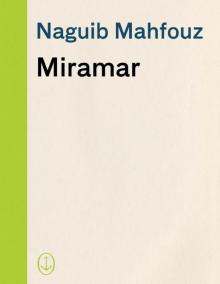 Miramar
Miramar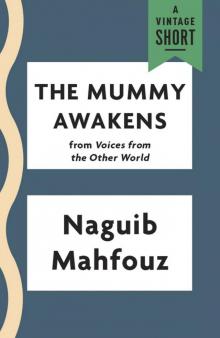 The Mummy Awakens
The Mummy Awakens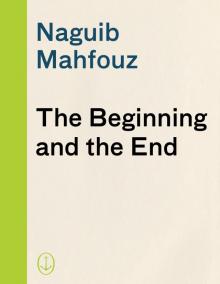 The Beginning and the End
The Beginning and the End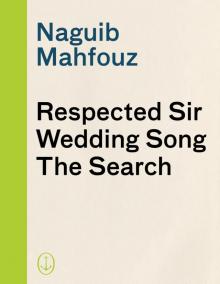 Respected Sir, Wedding Song, the Search
Respected Sir, Wedding Song, the Search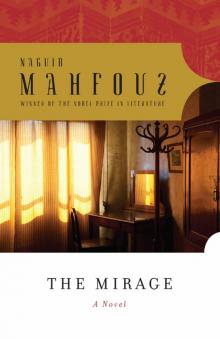 The Mirage
The Mirage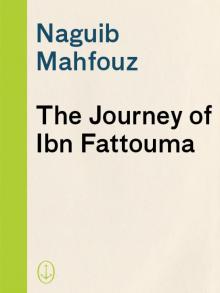 Novels by Naguib Mahfouz
Novels by Naguib Mahfouz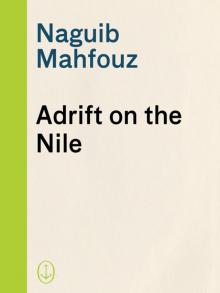 Adrift on the Nile
Adrift on the Nile Karnak Café
Karnak Café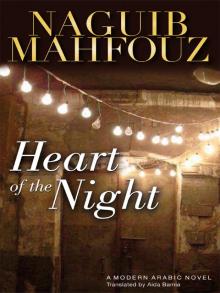 Heart of the Night
Heart of the Night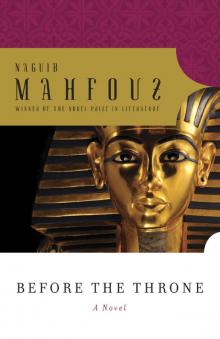 Before the Throne
Before the Throne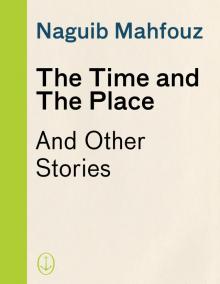 The Time and the Place: And Other Stories
The Time and the Place: And Other Stories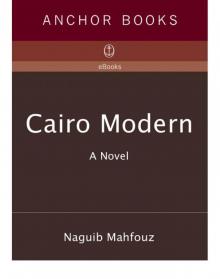 Cairo Modern
Cairo Modern Arabian Nights and Days
Arabian Nights and Days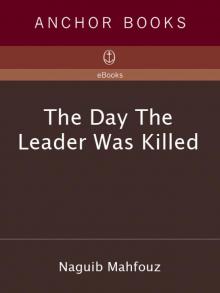 The Day the Leader Was Killed
The Day the Leader Was Killed Morning and Evening Talk
Morning and Evening Talk Three Novels of Ancient Egypt Khufu's Wisdom
Three Novels of Ancient Egypt Khufu's Wisdom Akhenaten: Dweller in Truth
Akhenaten: Dweller in Truth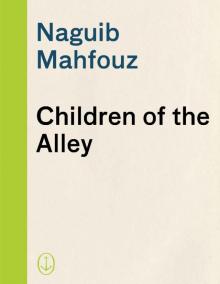 Children of the Alley
Children of the Alley Voices From the Other World
Voices From the Other World The Harafish
The Harafish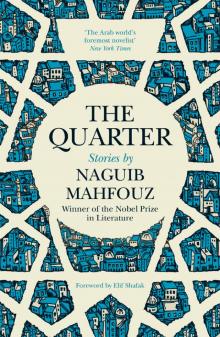 The Quarter
The Quarter The Seventh Heaven: Supernatural Tales
The Seventh Heaven: Supernatural Tales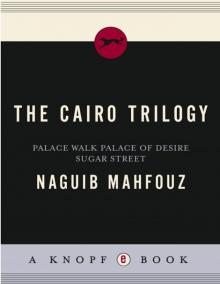 The Cairo Trilogy: Palace Walk, Palace of Desire, Sugar Street
The Cairo Trilogy: Palace Walk, Palace of Desire, Sugar Street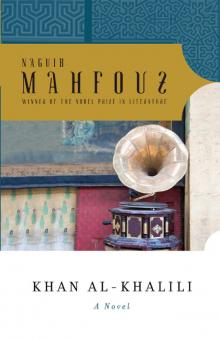 Khan Al-Khalili
Khan Al-Khalili Three Novels of Ancient Egypt Khufu's Wisdom, Rhadopis of Nubia, Thebes at War
Three Novels of Ancient Egypt Khufu's Wisdom, Rhadopis of Nubia, Thebes at War Three Novels of Ancient Egypt
Three Novels of Ancient Egypt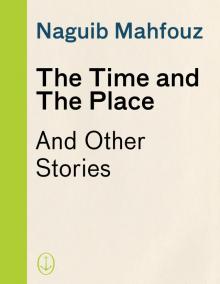 The Time and the Place
The Time and the Place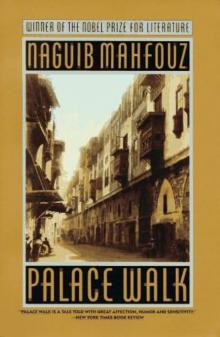 Palace Walk tct-1
Palace Walk tct-1 Akhenaten
Akhenaten The Seventh Heaven
The Seventh Heaven The Thief and the Dogs
The Thief and the Dogs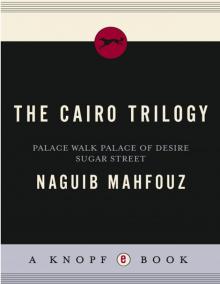 The Cairo Trilogy
The Cairo Trilogy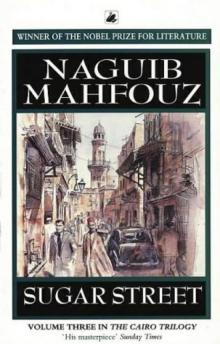 Sugar Street tct-3
Sugar Street tct-3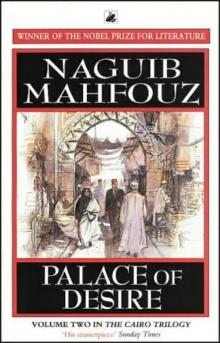 Palace of Desire tct-2
Palace of Desire tct-2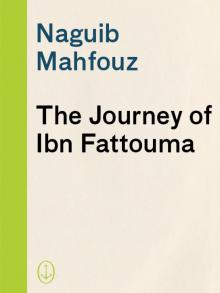 The Journey of Ibn Fattouma
The Journey of Ibn Fattouma